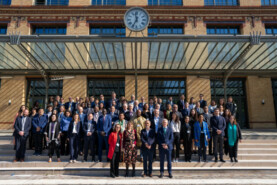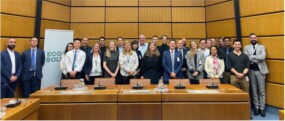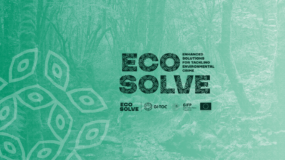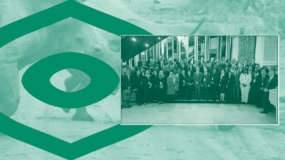PRESS KIT
Insufficient data, weak cooperation, excluded communities, and corruption hamper an effective response to environmental crime. ECO-SOLVE uses innovative approaches to dismantle environmental crime networks.
BRUSSELS 20 March 2024
A new, three-year project funded by the European Union will use artificial intelligence and cutting-edge digital analysis to produce new responses to environmental crime. Implemented by the Global Initiative Against Transnational Organized Crime, ECO-SOLVE will provide law enforcement, policymakers, and local communities with invaluable information to fight online and offline illegal wildlife trade.
The impact of environmental crime goes beyond the immediate effect on animal populations and ecosystems. It is linked to illicit financial flows, high-level corruption, and widespread human rights abuses, which threaten peace and stability. Drawing from the data of the GI-TOC Global Organized Crime Index 2023, organized environmental crime is on the rise globally, with a significant impact on communities around the world. In total 117 countries were found to have significant criminal markets in the trafficking and exploitation of fauna, flora or non-renewable resources, but 36 countries – mainly in Africa, Asia, and the Americas – stand out as having critically high levels of criminality in all three environmental crime.
ECO-SOLVE made its official debut at a high-profile event in Brussels on March 20, 2024. Discussions featured insights from Europol and the European Multidisciplinary Platform Against Criminal Threats on combating cyber wildlife crime in Europe. Environmental advocates Jeremey Phan (Laos) and Sofia Olviedo (Paraguay), along with Kenyan anti-corruption activist John Githongo, underscored the critical role of community engagement and the challenges in battling crimes like rhino poaching, as detailed by Kruger National Park’s Head Ranger Cathy Dreyer.
“Environmental crime is a key global threat and a priority for the EU,” said Maria Rosa Sabbatelli, Head of the Transnational and Regional Threats and Challenges Unit, at the EU’s Service for Foreign Policy Instrument, speaking at the launch of ECO-SOLVE.
“ECO-SOLVE recognizes the importance of cultivating strong relationships with law enforcement agencies, policymakers, private sector organizations, civil society, and local communities.” Said Mark Shaw, Director of the GI-TOC, “The purpose of this launch event is to bring our partners into the conversation about the importance of the problems we’re trying to solve and to include them in ECO-SOLVE’s mission to do so.”
“We’re developing global databases on online wildlife trafficking and enabling the response with global collaboration,” said Simone Haysom, Head of ECO-SOLVE, “We’re finding ways to include community voices in local law enforcement strategies and global platforms. We’re exposing the corrupt elites behind timber trafficking. We’re promoting a strategic approach to bring technologies to the frontline”.
The project’s global database – powered by a Global Monitoring System patrolling markets for endangered and protected wildlife online across six key regions of the world – is building out a system for automatic flagging of suspicious content using AI-enabled algorithms, first based on reading advert texts. Ultimately, AI image recognition is hoped to be incorporated into the system. The project is offering challenge-fund-type grants to organizations able to advance the quest for amassing large and relevant training sets to enable this technology.
This initiative, part of the Global Illicit Flows Programme (GIFP) and running until August 2026, aims to refine the global fight against environmental crime by enhancing data sharing, law enforcement collaborations, and community-driven strategies.
About the Global Initiative Against Transnational Organized Crime
The GI-TOC is a non-profit international organization comprising a network of over 600 independent global and regional experts. The GI-TOC seeks to open new lines of analysis to provide creative solutions to the challenges of organized crime, and to serve as an exchange and collaboration platform among governments, civil society, scholars, the private sector and other actors. Founded in 2013 and headquartered in Geneva, the GI-TOC has representation on every continent (more information here).
For more information, please contact: Claudio Landi, Head of Outreach and Digital Projects. We welcome inquiries from the media and are available to provide additional details, answer questions, and arrange interviews at your convenience.
Visit the project’s website: ecosolve.eco

PRESS KIT
NUEVO PROYECTO FINANCIADO POR LA UE PARA COMBATIR LOS DELITOS MEDIOAMBIENTALES CON INTELIGENCIA ARTIFICIAL Y DE FUENTES ABIERTAS
La falta de datos, una cooperación débil, la exclusión de las comunidades y la corrupción dificultan una respuesta eficaz a los delitos contra el medioambiente. El proyecto ECO-SOLVE utiliza enfoques innovadores para desarticular las redes criminales medioambientales.
BRUSELAS, 20 de marzo de 2024
Un nuevo proyecto financiado por la Unión Europea, con una duración de tres años, utilizará la inteligencia artificial y métodos novedosos de análisis digital para dar nuevas respuestas a los delitos contra el medioambiente. ECO-SOLVE, ejecutado por Global Initiative Against Transnational Organized Crime (Iniciativa global contra el crimen organizado transnacional, GI-TOC), proporcionará a las fuerzas del orden, los responsables políticos y las comunidades afectadas información necesaria para luchar contra el comercio ilegal de especies silvestres dentro y fuera de internet.
El impacto de los delitos contra el medioambiente va más allá del efecto inmediato sobre las poblaciones animales y los ecosistemas. Estos delitos también están vinculados a flujos financieros ilícitos, a la corrupción y a violaciones de los derechos humanos, amenazando la paz y la estabilidad. Según los datos del Índice global de crimen organizado 2023 de GI-TOC, el crimen organizado contra el medioambiente está aumentando a nivel global e impacta significativamente a comunidades de todo el mundo. Los hallazgos del índice señalan que un total de 117 países tienen importantes mercados criminales de tráfico y explotación de fauna, flora o recursos no renovables, pero 36 países (principalmente de África, Asia y América) destacan por tener niveles críticamente altos de criminalidad en los tres delitos contra el medioambiente que mide el índice.
El proyecto ECO-SOLVE se presentó oficialmente en un acto de alto nivel en Bruselas el 20 de marzo de 2024. En el evento, se presentaron las perspectivas de Europol y de la European Multidisciplinary Platform Against Criminal Threats (Plataforma multidisciplinar europea contra las amenazas criminales) sobre el combate a los delitos cibernéticos contra la vida silvestre en Europa. Los defensores del medioambiente Jeremey Phan (Laos) y Sofía Olviedo (Paraguay), junto con el activista anticorrupción keniano John Githongo, subrayaron el papel fundamental de las comunidades y los retos que plantea la lucha contra delitos como la caza furtiva de rinocerontes, tal como explicó Cathy Dreyer, guardabosques del Parque Nacional Kruger.
«Los crímenes contra el medioambiente son una amenaza mundial grave y una prioridad para la UE», dijo Maria Rosa Sabbatelli, líder de la Unidad de Amenazas y Desafíos Transnacionales y Regionales del Servicio de Instrumentos de Política Exterior de la UE, en su intervención en la presentación de ECO-SOLVE.
«ECO-SOLVE reconoce la importancia de cultivar relaciones sólidas con los organismos de seguridad, los responsables políticos, las organizaciones del sector privado, la sociedad civil y las comunidades», dijo Mark Shaw, director de GI-TOC. «El objetivo de este acto de presentación es incorporar a nuestros socios a la conversación sobre la importancia de los problemas que intentamos resolver e incluirlos en la misión de ECO-SOLVE para lograrlo».
«Estamos elaborando bases de datos mundiales sobre el tráfico de especies silvestres en internet y facilitando su respuesta gracias a la colaboración mundial», dijo Simone Haysom, directora de ECO-SOLVE. «Estamos encontrando formas de incluir las voces de las comunidades en las estrategias de seguridad locales y en las plataformas mundiales. Estamos exponiendo las élites corruptas que están detrás del tráfico de madera. Estamos promoviendo un enfoque estratégico para traer las tecnologías a esta lucha».
La base de datos del proyecto, alimentada por un sistema mundial de vigilancia que inspecciona los mercados digitales de especies silvestres en peligro y protegidas en seis regiones clave del mundo, está creando un sistema de señalización automática de contenidos sospechosos mediante algoritmos basados en IA, a partir de la lectura de textos publicitarios. Se espera también incorporar al sistema el reconocimiento de imágenes mediante IA. El proyecto ofrece subvenciones a organizaciones que avancen en la búsqueda de programas de formación amplios y relevantes para habilitar esta tecnología.
Esta iniciativa, que forma parte del Programa de los Flujos Ilícitos Globales de la Unión Europea y estará vigente hasta agosto de 2026, tiene por objeto mejorar la respuesta mundial a los delitos contra el medioambiente reforzando el intercambio de datos, la colaboración entre los organismos de seguridad y las estrategias impulsadas por las comunidades.
Acerca de Global Initiative Against Transnational Organized Crime
GI-TOC es una organización internacional sin ánimo de lucro formada por una red de más de 600 expertos mundiales y regionales independientes. GI-TOC busca abrir nuevas líneas de análisis para aportar soluciones creativas a los retos del crimen organizado, y servir de plataforma de intercambio y colaboración entre Gobiernos, sociedad civil, académicos, el sector privado y otros actores. Fundada en 2013 y con sede en Ginebra, GI-TOC tiene representación en todos los continentes (más información aquí).
Para más información, póngase en contacto con Claudio Landi, responsable de divulgación y proyectos digitales de GI-TOC.
Aceptamos consultas de los medios de comunicación y estamos a su disposición para facilitarles más información, responder a sus preguntas y concertar entrevistas cuando lo consideren oportuno.
Visite el sitio web del proyecto: ecosolve.eco

PRESS KIT
NOVO PROJECTO FINANCIADO PELA UE PARA COMBATER CRIMES AMBIENTAIS COM INTELIGÊNCIA ARTIFICIAL E FONTES ABERTAS
A falta de dados, a fraca cooperação, a exclusão das comunidades e a corrupção impedem uma resposta eficaz aos crimes contra o ambiente. O projeto ECO-SOLVE utiliza abordagens inovadoras para desmantelar as redes de criminalidade ambiental.
BRUXELAS, 20 de março de 2024
Um novo projeto de três anos financiado pela União Europeia utilizará a inteligência artificial e métodos de análise digital de última geração para dar novas respostas aos crimes ambientais. O ECO-SOLVE, implementado pela Global Initiative Against Transnational Organized Crime (Iniciativa Global contra o Crime Organizado Transnacional, GI-TOC), fornecerá às autoridades policiais, aos decisores políticos e às comunidades afetadas as informações necessárias para combater o comércio ilegal de animais selvagens dentro e fora da internet.
O impacto dos crimes ambientais vai para além do efeito imediato nas populações animais e nos ecossistemas. Estes crimes estão também associados a fluxos financeiros ilícitos, à corrupção e a violações dos direitos humanos, ameaçando a paz e a estabilidade. De acordo com os dados do Índice Global de Crime Organizado da GI-TOC, a criminalidade ambiental organizada está aumentando a nível mundial e tem um impacto significativo nas comunidades de todo o planeta. Os resultados do índice indicam que um total de 117 países têm mercados criminosos significativos para o tráfico e a exploração da vida selvagem ou de recursos não renováveis, mas 36 países (principalmente em África, na Ásia e nas Américas) destacam-se como tendo níveis criticamente elevados de criminalidade nos três crimes ambientais medidos pelo índice.
O projeto ECO-SOLVE foi oficialmente lançado num evento de alto nível em Bruxelas, em 20 de março de 2024. As apresentações incluíram perspectivas da Europol e da European Multidisciplinary Platform Against Criminal Threats (Plataforma Multidisciplinar Europeia contra as Ameaças Criminosas) sobre a forma de combater o cibercrime contra a vida selvagem na Europa. Os ativistas ambientais Jeremey Phan (Laos) e Sofia Olviedo (Paraguai), juntamente com o ativista queniano anticorrupção John Githongo, destacaram o papel crucial das comunidades e os desafios no combate a crimes como a caça furtiva de rinocerontes, conforme explicado por Cathy Dreyer, guarda-florestal do Parque Nacional Kruger.
“Os crimes contra o ambiente constituem uma grave ameaça mundial e uma prioridade para a UE”, disse Maria Rosa Sabbatelli, chefe da Unidade “Ameaças e Desafios Transnacionais e Regionais” do Serviço de Instrumentos de Política Externa da UE, no lançamento do ECO-SOLVE.
“O ECO-SOLVE reconhece a importância de cultivar relações fortes com as agências de segurança, os decisores políticos, as organizações do sector privado, a sociedade civil e as comunidades”, disse Mark Shaw, diretor da GI-TOC. “O objetivo deste evento de lançamento é trazer os nossos parceiros para a conversa sobre a importância dos problemas que estamos tentando resolver e incluí-los na missão do ECO-SOLVE para fazê-lo”.
“Estamos criando bases de dados globais sobre o tráfico de animais selvagens na Internet e facilitando a resposta através da colaboração global”, disse Simone Haysom, directora do ECO-SOLVE. “Estamos encontrando formas de incluir as vozes das comunidades nas estratégias de segurança locais e nas plataformas globais. Estamos expondo as elites corruptas por detrás do comércio de madeira. Estamos promovendo uma abordagem estratégica para trazer as tecnologias para esta luta”.
A base de dados do projeto, alimentada por um sistema de vigilância global que monitoriza os mercados digitais de animais selvagens ameaçados e protegidos em seis regiões chave do mundo, está criando um sistema de sinalização automática de conteúdos suspeitos utilizando algoritmos baseados em IA, com base na leitura de textos publicitários. Espera-se também incorporar no sistema o reconhecimento de imagens baseado em IA. O projeto oferece subvenções a organizações que avancem na procura de programas de treinamento extensos e relevantes para colocar esta tecnologia em uso.
Esta iniciativa, que faz parte do Programa Global de Fluxos Ilícitos da UE e decorre até agosto de 2026, visa melhorar a resposta global aos crimes ambientais através do reforço da partilha de dados, da colaboração entre as autoridades responsáveis pela aplicação da lei e de estratégias orientadas para a comunidade.
Sobre Global Initiative Against Transnational Organized Crime
A GI-TOC é uma organização internacional sem fins lucrativos formada por uma rede de mais de 600 peritos independentes a nível mundial e regional. A GI-TOC procura abrir novas linhas de análise para fornecer soluções criativas para os desafios da criminalidade organizada e servir de plataforma de intercâmbio e colaboração entre governos, sociedade civil, universidades, sector privado e outros intervenientes. Fundado em 2013 e sediado em Genebra, a GI-TOC está representado em todos os continentes (mais informações aqui).
Para mais informações, contactar Claudio Landi, responsável pelos projetos digitais e de divulgação da GI-TOC.
Aceitamos consultas da mídia e estamos disponíveis para fornecer mais informações, responder perguntas e marcar entrevistas, se necessário.
Visite o sítio Web do projeto: ecosolve.eco





